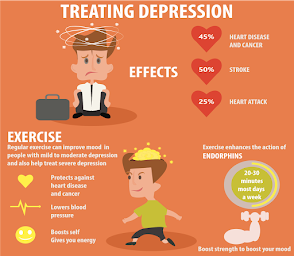Natural Method for Improvement of Depression
Introduction
Depression is something that affects most people personally, either they have it or someone they know does. There are many ways depression is currently treated, oftentimes jumping right into different medications with some horrible side effects. Exercise has shown to be a very effective method for those looking for the more natural route of feeling healthier and happier.
Literature Review Evidence
After looking into the topic more it was found that overall, aerobic exercise when combined with therapy worked for people just as well as medications and allows people the feeling of being in control of their mental health. This method works for children suffering depression all the way up through older adults, and the interesting part is if you are not able to complete aerobic exercise, other forms of exercise such as stretching have been shown to have significant effects as well.
Getting Started
For those looking to get started, implementing an exercise program that you stick to can be hard. Oftentimes we feel there is not enough time in the day to get it done or that we do not know enough ourselves of how to begin an exercise routine. Some easy ways to do this are:
Set aside a period of time for exercise
Research exercises that will fit your needs
Research programs and find some that will fit for you
Visit a personal trainer to get started if needed
Added Benefits of Exercise
Along with the improvement of mental health, there are many other benefits to exercising:
Improve overall brain function
Weight management
Lower blood pressure
Protect against chronic diseases
Keeps joints healthy
For more information visit:
https://www.self.com/story/popular-at-home-workout-programs
https://www.verywellfit.com/two-cardio-workouts-for-beginners-1230807
About the Author
Makayla Campelo is a senior Movement Science major with concentration in Sports Medicine at Westfield State University. After Westfield State, she plans to continue onto Physician Assistant school at Boston University. You can contact her through email at mcampelo8813@westfield.ma.edu
References
Blumenthal, J. A., Smith, P. J., & Hoffman, B. M. (2012). Is Exercise a Viable Treatment for Depression.
ACSM Health and Fitness Journal, 16(4). https://www.ncbi.nlm.nih.gov/pmc/articles/PMC3674785/#.
Callaghan, P., Khallil, E., Morres, I., & Carter, T. I. (2011). Pragmatic randomisedcontrolled trial of
preferred intensity exercise in women living with depression. BMC Public Health, 11.
https://link.springer.com/article/10.1186/1471-2458-11-465.
Carter, T., Guo, B., Turner, D., Morres, I., Khalil, E., Brighton, E., … Callaghan, P. (2015). Preferred
intensity exercise for adolescents receiving treatment for depression: a pragmatic randomized
controlled trial. BMC Psychiatry, 15. https://link.springer.com/article/10.1186/s12888-015-0638-
Cooney, G. M., Dwan, K., Greig, C. A., Lawlor, D. A., Rimer, J., Waugh, F. R., … Mead, G. E. (2013).
Exercise for depression. Cochrane Database of Systematic Reviews, (9).
https://www.cochranelibrary.com/cdsr/doi/10.1002/14651858.CD004366.pub6/full.
Eriksson, S., & Gard, G. (2011). Physical exercise and depression. Physical Therapy Reviews, 16(4), 261–
268. https://www.tandfonline.com/doi/abs/10.1179/1743288X11Y.0000000026.



Comments
Post a Comment